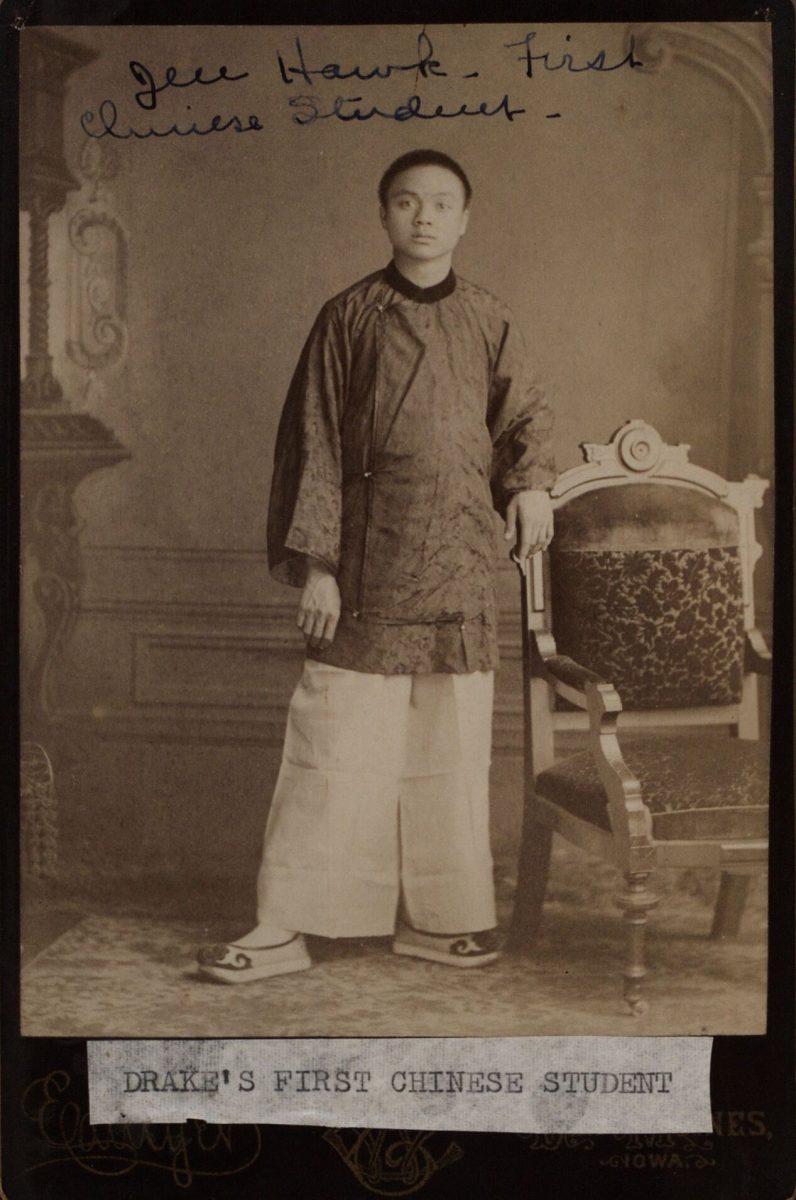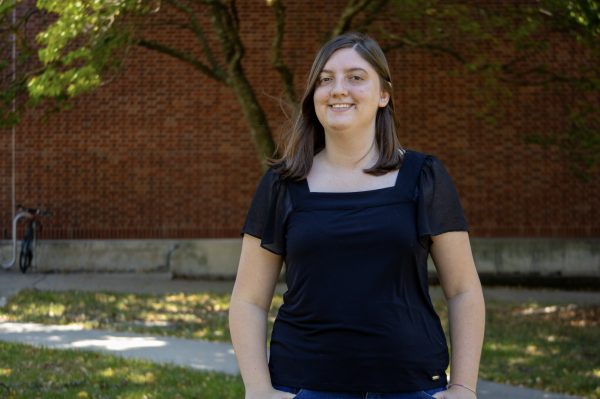In 1887, six years after Drake University’s founding and five years after the Chinese Exclusion Act — a 10-year ban prohibiting Chinese laborers both “skilled and unskilled” from entering the United States — Jeu Hawk, a Chinese immigrant, began his studies at Drake. After graduating, Hawk would encourage other Chinese immigrants to attend Drake.
Hawk is one of three Chinese immigrants who attended Drake during this period and is one of many early international students. Last year, history and international relations major Kaiya Kielb Young assisted former Drake history professor En Li in a research project analyzing Drake’s connections to China. Young focused on these early Chinese students.
“For me, the importance of the research is emphasizing that these connections between different countries, different cultures have existed throughout history,” Young said. “Intercultural competency, intercultural awareness is not something new. It’s always existed within our society. These relations are more than just country-to-country — they exist on the personal level, and people have been influenced by these personal experiences and these personal relations.”
Li, who taught Chinese history, began the project in part as a way to make Chinese history more relevant to Drake students.
“Especially since the COVID-19 pandemic unfolded in 2020, there has been increasing hostility and biases towards China and Chinese people,” Li said in an email interview. “I hope a different part of history, especially those ‘people-to-people’ cultural exchanges between China and the U.S., would serve as ‘backdoor’ diplomacy to change China’s image among American students.”
Li and her research assistants compiled the information into a research guide available through Cowles Library.
“In general, international students coming to study in the U.S. is not a modern phenomenon, but it’s an ongoing process with rich history,” Li said. “…The Midwest is an important part of the story, and more importantly, the Iowa [and] Drake chapter is so unexpected that it raises fascinating questions about the conventional narrative.”
Students from England, Canada, Australia, China, Japan and the Philippines would start enrolling at Drake practically from its inception in 1881, according to “Living on the Edge of Tomorrow,” a history of Drake written by Linda Hunter Mason. Most international students had heard of Drake from missionaries stationed in their countries, according to the book.
The Times-Delphic, whose early monthly magazine form had a “local and personal” section, includes some announcements related to them.
“A Japanese Boy, N. Kaiwai, of Akita, Japan, now in training by the Cedar Rapids Christian Church, will enter the Bible department next fall to finish the course. He will become a missionary to his native land,” reads the Times-Delphic’s November 1889 edition.
In their research, Li and Young uncovered the stories of three early Drake students from China.
Jeu Hawk
It is unclear how Hawk, the first student from China to attend Drake, arrived in the country, especially since the Chinese Exclusion Act would be enforced only one year later. Young said he arrived in California with his older brother before traveling to St. Louis, Missouri. At a sunday school in St. Louis, a nun directed Hawk to Drake, where he enrolled in the Bible College at Drake University. While at Drake, he would join an early literary society called the Berean Society, later serving as their secretary.
Hawk would return to China two years after enrolling at Drake.
“Jeu Hawk will not return to Drake on account of the opposition of his father,” reads the “local and personal” section of the January 1889 Times-Delphic edition. “He wishes to be remembered kindly to the faculty and all his Drake friends.”
Travel at the time would have been difficult given the lack of options for overseas travel besides by ship. University Archives Associate Benedict Chatelain said it could have taken Hawk weeks to get from country to country.
“It couldn’t have been easy. I imagine it would have happened in steps,” Chatelain said.
These steps could have including stopping at various ports along the way.
Hawk would later return to Drake in February of 1890, which the Times-Delphic again announced. He would graduate in 1893 and move to Portland, Oregon where he joined the Chinese Christian Association. There he met Louis Hugh, another Chinese immigrant, who he encouraged to attend Drake.
According to an academic article titled “Oregon’s Pioneer Chinese Law Students and Their Untold Stories” by Oregon Voices and Li Chen, in 1896, Hawk enrolled in the University of Oregon’s medical college, where he earned his Doctor of Medicine degree. He was the first known Chinese person to receive a college degree in Oregon but because of the Chinese Exclusion Act could not pursue employment in the U.S..
Hawk would return to China in 1900 and serve as president of the Hong Kong Medical Association twice — once from 1923 to 1924 and again from 1928 to 1929.
Bang Lee
Bang Lee would be the second student from China to attend Drake. Like Hawk, he enrolled in the Bible College but did not graduate, only attending for one year. Because of the short length of time and the commonality of his name, it was difficult for Young to find any information on him.
It is mysteries like this that Young and Chatelain’s research hopes to uncover. Chatelain said that he hopes to uncover more about the lives of early international students and how they were treated at Drake.
“They were students here, but that doesn’t necessarily mean that they were well-received,” Chatelain said.
Louis Hugh
Hugh attended the Bible College in 1896 after Hawk’s encouragement. He graduated in 1899. However, his experience would have been different from Hawk’s.
“He did not really speak English [when he came to Des Moines],” Young said. “To the best of our knowledge, what I found was he attended a sort of elementary school class in the area where he learned English before actually enrolling and coming to Drake.”
While at Drake, according to the July 21 edition of the Schaller Herald News, Hugh delivered a talk on “China, her People and their Customs” accompanied by vocal and instrumental music, including his own “Yung Kum or Chinese harp.”
According to “Making Disciples in Oregon,” Hugh would move back to Oregon after graduating. Hugh took charge of Portland Chinese Christian Association’s China Mission from Hawk.
“During this administration, the Mission reached its apex of Christian usefulness,” reads “Making Disciples in Oregon.”
In 1909, Hugh resigned charge of the mission to take a government position in China.








